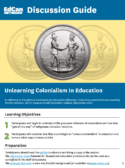Unlearning Colonialism In Education Discussion Guide
EdCan discussion guides offer a chance to think more deeply about an Education Canada article and to work on applying the author’s ideas to your own educational context. Designed to help facilitate a discussion among school staff and professional learning groups, EdCan’s Discussion Guides are also easily adapted for individual learning.
In addition to the article and discussion guide, Education Canada includes two additional components:
- a podcast interview with the author, Dr. Dwayne Donald.
- a knowledge exchange between the author and a group of education professionals.
to watch and listen together as a lead-in to your own guided discussion.
Education Canada Discussion Guides and Kits are an EdCan Member Exclusive Benefit for Organizations (School Districts, Faculties of Education, Corporations, Non-Profits), transforming research-informed literature from our critically-acclaimed Education Canada Magazine into practical group discussion and self-reflection guides that can be used by K-12 staff to question, strengthen, and improve their professional practice across a variety of current and emerging trends in education.
Whether you’re an educational assistant, teacher, school leader, or superintendent, we encourage you to invest in your continuous learning and that of your team through these easy-to-use and affordable professional development resources that encourage critical thinking and actionable strategies for unique school contexts.
In reference to the article, A Curriculum for Education Differently: Unlearning colonialism and renewing kinship relations
how to use education canada discussion guides and kits
Each group discussion or self-reflection guide contains three key components:
- A Cheat Sheet providing a brief summary of the literature, which is intended to facilitate and support the uptake of group discussion within your school community.
- A Reflect section with 2-4 thought provoking questions prompting participants to self-reflect in conjunction with their own thoughts and opinions in response to the article.
- A Do It section that provides participants with the opportunity to engage with the content in a more interactive way. By completing this interactive activity, participants are encouraged to think about how they can apply their newfound learnings to their professional practice.
Education Canada Discussion Guides and Kits have two-fold usage:
- Group discussions: School leaders can use discussion kits for staff Professional Development (PD) by facilitating discussion during a staff meeting or other designated PD time. Principals can lead sessions by selecting a group discussion guide according to their preference, introducing the theme of the guide, providing a summary of the literature, and finally proceeding to facilitate and participate in discussion by asking the suggested questions and interactive activity provided. Discussion kits can also be used during more informal group discussions (i.e. among colleagues) without the presence of an administrator to facilitate.
- Self-reflections: Discussion kits can also be used alone by individual K-12 staff members who are looking to improve their professional practice on their own time. Additionally, newfound knowledge can help individual staff members to later spark and inform conversations with their colleagues.
If you’re an EdCan member, you’ll be able to access the full version of the Discussion Guide, including all of our other archived and upcoming discussion kits! Simply fill out the form below! Not sure if you’re a member? Check out our list of members here. If you’re an employee of one of the organizations listed, or a student or faculty member of a university listed, then you’re already a member! Click here to create your employee, student, or faculty account. Note: To access this discussion guide, you must have an organizational membership, meaning that you are an employee, student, or faculty member of the following: Not a member yet? To gain unlimited access to all our discussion guides, explore our membership options here. If you require any assistance or have any questions with regards to becoming a member please contact membership@edcan.ca.
Ready? Request the full copy now!
FOR EDCAN MEMBERS
Full Copy Request Form – Discussion Guide

